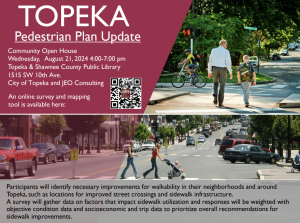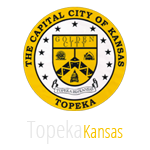The City of Topeka has deployed all available resources in response to significant damage and disruptions caused by Wednesday night’s storm in the River Corridor, Potwin, and Oakland neighborhoods. Additionally, debris pickup is planned for residents next week.
This storm left multiple streets blocked by fallen trees and downed power lines, resulting in widespread power outages. Public Works staff, supported by the Utilities Department, began a systematic inspection of the affected streets Thursday morning. The primary goal for crews is to move debris to the side of the road to restore access to traffic as quickly as possible.
“We are fully aware of the road closures and the impact on our community. Every available resource is being utilized to open the streets and ensure the safety of our citizens,” said Assistant City Manager and Interim Public Works Director Braxton Copley.
In some instances, city crews must wait for Evergy to clear power lines before proceeding with debris removal. After the initial debris push, staff will begin the cleanup of rights-of-way and start addressing Service Call Form (SCF) tickets.
Additionally, the City is mobilizing third party contractors to assist with cleanup. Residents may place tree and brush debris produced by this storm at the curb. Pickup of that debris will begin Monday, August 19 at approximately 7 a.m. Contractors will begin pickup efforts in the areas that were hardest hit, and then spread out to the rest of the city. Crews will only pick up tree and brush. Garbage, damaged appliances, carpet, furniture, or household goods will not be picked up.
Debris pickup will be done using large grapple trucks. Please place any brush in piles near the back of the curb in a clear area. Do not place debris near mailboxes, fences, or any other structure or under any trees or power lines.
The city asks for the community’s patience as we work to clear neighborhood streets.
For updates, please visit the City of Topeka’s official website at www.topeka.org and our social media channels.
The City of Topeka has appointed Braxton Copley as assistant city manager. Copley, who most-recently served as the director of public works, brings more than 19 years of service to the city.
Copley’s leadership in the Public Works Department has been instrumental in advancing the city’s infrastructure. He holds a bachelor’s degree from Colorado College and a Juris Doctor from the University of Kansas. He also has numerous nationally recognized technical certifications.
“Braxton has done an incredible job as the director of public works, and we are confident he will excel in his new role as assistant city manager,” said Topeka City Manager Dr. Robert Perez.
In his new role, Copley will oversee infrastructure and development departments. He will also serve as interim public works director while the city searches for his replacement. The city still plans to hire a deputy city manager.
The City of Topeka looks forward to Copley’s continued contributions in his new position.

This month the Metropolitan Topeka Planning Organization (MTPO), in coordination with the City of Topeka, is kicking off the planning process for the Update of the City’s 2016 Pedestrian Plan. The plan’s goal is to continue creating safe and connected walkways between schools, parks, shopping districts, workplaces, and other popular destinations. Anyone interested in the walkability and connectivity of Topeka is encouraged to attend this open house from 4 to 7 p.m., Wednesday, August 21, at the Topeka & Shawnee County Public Library, 1515 SW 10th Ave.
City staff and project professionals from JEO Consulting Group will present the open house. Displays will include areas of demand from 2016, improvements since then, improvements planned with RAISE grant funding, neighborhood health data, vehicle ownership data, usage by modality, crash data, and safe school routes. Participants will identify necessary improvements for walkability in their neighborhoods and around Topeka, such as locations for improved street crossings and sidewalk infrastructure.
A survey will gather data on factors that impact sidewalk utilization and responses will be weighted with objective condition data and socioeconomic and trip data to prioritize overall recommendations for sidewalk improvements. For those who cannot attend the open house, an online survey and mapping tool are available on the project website at https://arcg.is/0WeH9X and will remain open through September 4. The input gathered will inform the initial draft of the Topeka Pedestrian Plan Update. A second open house will occur later in 2024 to discuss the draft plan with the community.
This plan is just one piece of a more considerable effort to improve the quality of life through of vibrant neighborhoods and better transportation choices for pedestrians, bicyclists, transit users, and motorists.
For more information, visit the MTPO website at https://topekampo.org/pedestrian-master-plan/ or contact the City of Topeka Planning Department at (785) 368-3728

The City of Topeka is assisting 18 residents after the discovery of unsanitary conditions and a carbon monoxide leak at an apartment building on Wednesday afternoon in East Topeka.
On August 7, 2024, just before 1 p.m., crews from the Topeka Fire Department (TFD) responded to a reported chemical odor at a residential building located at 313 SE Lime St. Upon arrival, firefighters measured unsafe levels of carbon monoxide and immediately notified the Kansas Gas Service and the Topeka Police Department’s Property Maintenance Unit (PMU). Two juveniles were transported to a local hospital by medical personnel to be treated for non-life-threatening injuries.
As a result of PMU’s investigation, raw sewage was found and four apartments have been condemned. This is an ongoing investigation.
The City of Topeka’s Housing Services Division responded and is working with the affected residents to provide relocation assistance.
Since January 2024, Topeka and Shawnee County’s homeless population has increased by nine individuals according to the City of Topeka’s July Point in Time Homeless Count released Thursday, August 1.
The count took place on July 17, 2024. The one-day event provides a snapshot of the individuals in the community who are experiencing homelessness, as defined by the United States Department of Housing and Urban Development (HUD). More than 40 people helped with this July’s count.
According to the count, of 546 people and 433 households are experiencing homelessness in Topeka and Shawnee County. Of the 546 individuals 59% of those are male, while 40% are female, and 216 are unsheltered, or not living in an emergency shelter or transitional housing.
“With the rising numbers of those experiencing homelessness nationwide, we believe it’s crucial to collect data more regularly,” said Carrie Higgins, housing services division director. “Given the warmer weather and anticipated increase, we are encouraged to see only a modest rise since January. The count also provides a valuable opportunity to connect individuals experiencing homelessness to services and resources in the community.”
Below is a chart that breaks down the numbers from the previous four counts. For a more detailed look at the July 2024 numbers, visit: Summer PIT flyer.pdf (Summer+PIT+flyer.pdf (citymanager.s3.amazonaws.com)
To receive funding for programs, HUD requires communities complete a count each year. The count ensures the city can obtain the appropriate level of funding to be able to provide needed services to those experiencing homelessness and those at risk of homelessness.
| 2020 | 2021 | 2022 | 2023 | Jan.
2024 |
July 2024 | |
| People | 401 | 298 | 365 | 412 | 537 | 546 |
| Households | 306 | 254 | 297 | 322 | 442 | 443 |
| # of Veteran Households | 40 | 16 | 37 | 25 | 47 | 46 |
| # of Individuals in an Emergency Shelter | 254 | 155 | 163 | 194 | 276 | 255 |
| # of Individuals in Transitional Housing | 51 | 38 | 54 | 61 | 58 | 75 |
| # of Individuals Unsheltered | 68 | 105 | 148 | 157 | 203 | 216 |
On Tuesday, the City of Topeka’s Department of Administrative and Financial Services unveiled the proposed operating budget for fiscal year 2025.
The total city budget for fiscal year 2025 is $400.3 million, with a balanced General Fund budget of $128.4 million. The General Fund is the largest single fund, supporting many of the city’s municipal services. In response to inflation, as well as an increase in employee wages, city departments have had to meticulously manage and propose their budgets to ensure continued service delivery to residents.
“We have developed a budget for fiscal year 2025 that will allow the city to provide essential services to the citizens of Topeka. The Finance team has done an outstanding job balancing current needs with long-term sustainability. We have aligned city resources with our taxpayers’ highest priorities, and this budget will enable us to advance the City of Topeka,” said Ben Hart, Acting Chief Financial Officer.
Expenditure Highlights
- Increased Costs: Personnel and contracting costs comprising of 75.83% of the General Fund budget, increased by approximately $9.43 million, or 10.72% for personnel and $4.2 million, or 20% for contractual services. These cost increases are a combination of union contracts, inflation, and other contractual obligations.
- Property Tax Rebate Program: Continuing the success from last year’s budget, the city is keeping the Property Tax Rebate Program in place at $300,000. This program, modeled after the state’s Homestead Act, provides additional relief to eligible individuals.
Next Steps
- August 13, August 20, August 27: The budget will be presented at Governing Body meetings, where community members can offer public comment.
- September 3: A public budget hearing will provide another opportunity for citizens to give feedback on the budget.
- September 10: The anticipated date for budget adoption.
The proposed budget can be viewed online at City of Topeka Budget.
The City of Topeka has scheduled three public input sessions to gather community perspectives and priorities for the selection of Topeka’s next police chief. These in-person sessions will allow residents to share their ideas directly with the city manager. Interpretation services will be available. Details of the sessions are as follows:
Public Input Session #1
- Thursday, August 1, 2024
- 6 p.m. to 7 p.m.
- Topeka & Shawnee County Public Library, located at 1515 SW 10th Ave, Marvin Auditorium 101B
Public Input Session #2
- Friday, August 2, 2024
- 12 p.m. to 1 p.m.
- Cyrus K. Holliday Building, located at 620 SE Madison St, First Floor Conference room
Public Input Session #3
- Saturday, August 3, 2024
- 10 a.m. to 11 a.m.
- Hi-Crest CRC Care Center 455 SE Golf Park
The information gathered from the community survey and public input sessions will be used to update the job description for the police chief position. The selection process, led by an executive recruiter, will include several interview panels made up of councilmembers, law enforcement officials, and community members, media interviews and a public meet-and-greet before the final appointment of the new chief. Additional details on the meet-and-greet will be shared in the coming weeks.
“I am excited and hopeful as we embark on the selection process for Topeka’s next police chief,” said City Manager Robert Perez. “This must be a collaborative effort between the city and community, to ensure our next chief has department and community support and knows where to focus their energy. I have laid out an aggressive timeline for the selection, aiming to make the final appointment in late September or early October. I am confident this approach will help us select the best possible candidate for the job.”
The survey will close on August 2nd.
Residents can access the survey at:
English Survey – https://us.openforms.com/Form/f84b9c2b-0e91-42b9-95c8-d2541e7dc54c
Encuesta en Español– https://us.openforms.com/Form/74814400-794c-44cd-9825-d903dd7476b8
The City of Topeka is inviting community members to participate in the selection process for the next police chief by providing their input through a public survey and public input sessions.
The survey seeks to gather input on the qualities and priorities that citizens believe are most important for the next police chief. This feedback will play an important role in guiding the selection process and ensuring that the selected candidate aligns with the values and expectations of Topeka’s residents.
This is the first step in the selection process and will be followed by a series of public input sessions. Details on those sessions will be shared in the coming weeks.
“Selecting our next police chief is a critical decision that will impact the safety and well-being of our community,” said City Manager Robert Perez. “We want to ensure the selection process is transparent and inclusive, giving community members multiple opportunities to participate and share their perspectives.”
The survey will be open for two weeks and will close on August 2nd.
Residents can access the survey on our website at:
English Survey – https://us.openforms.com/Form/f84b9c2b-0e91-42b9-95c8-d2541e7dc54c
Encuesta en Español– https://us.openforms.com/Form/74814400-794c-44cd-9825-d903dd7476b8
The City of Topeka is pleased to announce updates to its retaliatory action ordinance, aimed at providing stronger protections for tenants and ensuring fair and safe housing practices within the city.
In July 2023, the Topeka City Council took a closer look at its retaliatory eviction ordinance, which allowed landlords to be held accountable for harassing and evicting tenants out of retaliation. Following collaboration between City Prosecution, Property Maintenance, Housing Services and the Fire Marshal’s Office and as part of the Changing Our Culture of Property Maintenance initiative, the Governing Body further amended and strengthened the policy in May 2024.
The city recognizes that many tenants hesitate to assert their rights to a clean, safe and sanitary dwelling due to fear of retaliation. The ordinance emphasizes that no tenant in good standing should face eviction as a result of retaliation or harassment.
“The thorough amendments to the City of Topeka’s Retaliatory Action ordinance have strengthened protections for tenants (renters),” said Tenant/Landlord Counseling and Education Program Manager Abi Panecatl with Housing and Credit Counseling, Inc. “Now, the priority is to educate our community about these changes. Informing landlords is crucial to help them recognize and address retaliatory behaviors. Equally important is empowering tenants to utilize the available remedies and enforcement mechanisms at their disposal.”
If you believe you or someone you know has been the victim of a retaliatory eviction or action, you may visit the city’s website or contact any of the following entities for more information:
Housing and Credit Counseling, Inc., (785) 234-0217
Property Maintenance Division, (785) 368-3171
In an effort to help the public gain a better understanding of the ordinance, Housing and Credit Counseling, Inc. is hosting several public engagement sessions. You must preregister for these workshops as space is limited:
Thursday, July 25-Landlord Training
3:00 pm-5 pm-KRLTA (including retaliation)
6:00 pm-8 pm-Fair Housing
Thursday, August 1-Tenant/Tenant Advocate Training
3:00 pm-5 pm-Renter Preparation (including retaliation)
5:15 pm-7 pm-Fair Housing
Thursday, September 19-Landlord Training
10:00 am-12:00 pm- KRLTA (including retaliation)
1:00 pm-3:00 pm-Fair Housing
Thursday, September 26-Tenant/Tenant Advocate Training
10:00 am-12:00 pm- KRLTA (including retaliation)
1:00 pm-3:00 pm-Fair Housing
The U.S. Department of Transportation (USDOT) announced the City of Topeka will receive a Raise Grant of $25 million to serve disadvantaged census tracts.
The project will cover 50 miles to construct new or improved sidewalks that will transform the River Road and other locations. The City of Topeka’s project is just one of 148 that were selected by the Biden-Harris Administration for the Rebuilding American Infrastructure with Sustainability and Equity (RAISE) discretionary grant program. This project will help ensure pedestrians will have safe and equitable access to daily destinations and local bus routes.
“This grant in the amount of $25 Million will allow us to do some transformative projects for the City of Topeka.” said Public Works Director Braxton Copley.
Key Transformative Projects:
- NE River Rd: NE Crane to NE Emmett Shared-Use Path, which will provide safe access between the Oakland neighborhood and Downtown Topeka.
- SE California Ave: 10th St to 10th Ave, which will provide a much safer pedestrian connection between NE Topeka to SE Topeka, as well as access to Topeka Cemetery and transit stops.
- Areas of North Topeka, such as NE Norris St (near Topeka Rescue Mission Distribution Center, ICI Manufacturing, and Topeka North Outreach Food Bank).
- The Central Highland Park neighborhood from SE Adams St to SE California Ave, and from SE 21st St to SE 29th
To learn more about the Department of Transportation’s announcement, please visit:
